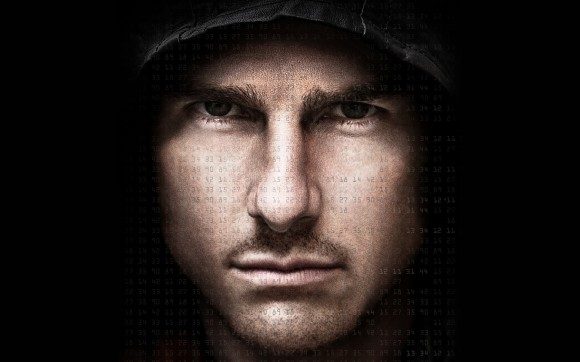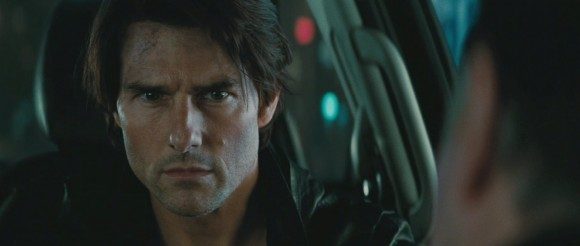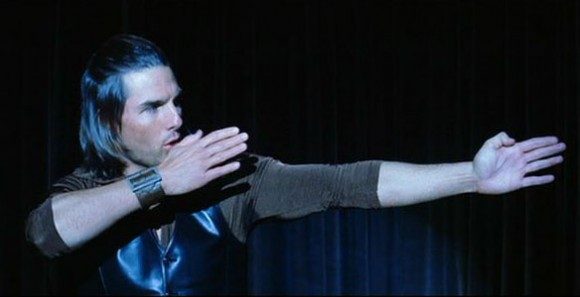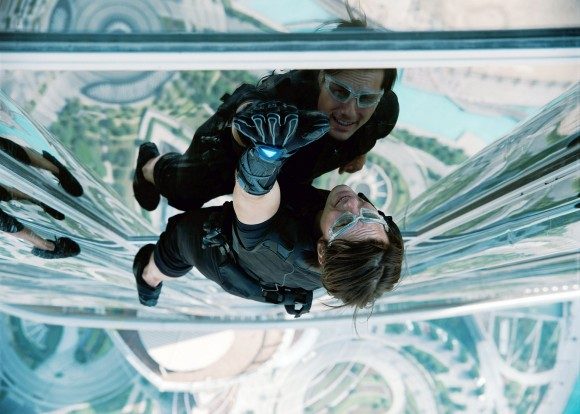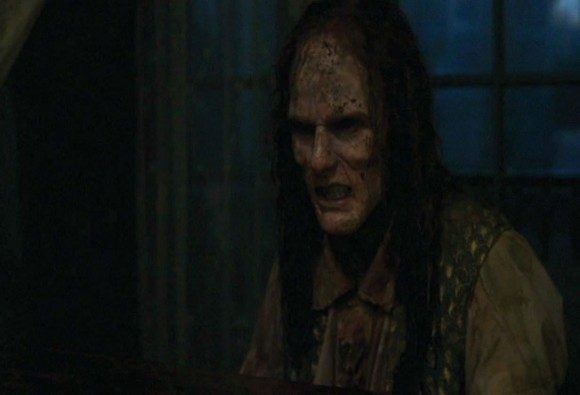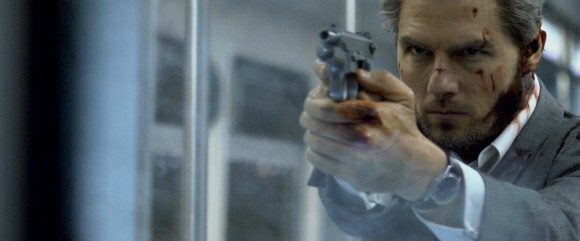Actor. Casanova. Action hero. Heartthrob. Scientologist. Madman. Egomaniac. Has-Been. Maverick. Movie Star.
Over the three and a half decades that he’s been in the Hollywood spotlight, Tom Cruise has worn more hats and been on top of more pedestals than any other actor of our time. He’s worked with practically every major director, explored almost every contemporary film genre, and been the center of more ridicule, hatred, and criticism than any comparable star. If nothing else, he’s never been a man to inspire weak opinions. When we’ve loved him, we’ve really loved him. And when we’ve hated him…well, we’ll get to that in a moment.
The Tom Cruise story is one we’ve all heard before: a hardworking kid from Syracuse, New York, decides he’s going to go for his dreams of big time movie stardom. After a series of small but memorable supporting roles, he lands a leading role that makes America sit up and take notice. He parlays a second major breakout job into a series of diverse roles that give him acting cred. He spends the next decade as emerging Hollywood royalty, combining big popcorn entertainment with more challenging artistic fare. Just as he’s at his most indestructible, however, everything falls apart. Following a high profile divorce, a steady increase in the public’s awareness of his steadfast devotion to a controversial religious movement, and one of the first major celebrity scandals to go viral in our modern definition of the term, the man’s public approval plummets. Everyone thinks that Tom Cruise is annoying, crazy, or both, we all get sick of him, and his cinematic star fades away.
Only… not really. Specifically not really the last part. Yes, we all did get sick of him, his uncomfortably public relationship with actress Katie Holmes, his ever more visible membership in the Church of Scientology, the whole package. But unlike the Lindsay Lohan types, Cruise’s presence on the silver screen wasn’t stalled by the controversy surrounding the man. In fact, it didn’t even hit a speed bump. Since 2005 the longest Cruise has been away from movie screens is a year and a half, and that’s the outlier. For the most part he’s been involved in at least one major motion picture per year.
And we’ve gone to see them. Oh yes, we have, don’t even try to deny it. Articles like this one love to push the idea that Cruise’s movies have been underperforming because they don’t reach some arbitrary prediction set forth by so-called “experts” or because they bring in less than $100 million domestic, but it’s all hogwash. The fact of the matter is that it’s extremely hard to find a Tom Cruise movie in the last ten years that has not been obscenely profitable. Jack Reacher? $218 million worldwide. Ghost Protocol? $694 million worldwide. War of the Worlds, released in height of anti-Cruise fever? $591 million worldwide, the fourth highest grossing movie that year. So we got sick of him, but it was that special kind of sick of him where we also couldn’t get enough of him. What could account for this extremely odd behavior?
Hollywood has always been keenly aware of the bizarre phenomenon that is “star power.” See an actor enough times and you start to just see certain elements in everything that they do, no matter what their role is. The down-to-Earth Americana of James Stewart. The suave sophistication of Cary Grant. The classy, effortless sex appeal of Audrey Hepburn. All truly great filmmakers know that part of working with a renowned film star is finding the way to get the baggage they bring with them to work for your film, whether it’s by reinforcing said baggage or by subverting it.
Tom Cruise is no exception. If I asked you to close your eyes and picture the typical Tom Cruise film role, chances are that some very specific signifiers would come into your mind. He’d look capable and heroic, handsome and slick with a charming grin. He’s grounded and athletic, moral and dependable. He’s an action star for the nineties and beyond, equal parts debonair James Bond and rough and tumble Indiana Jones. And he runs a lot. We recognize it instantly, and it fits Cruise like a glove.
There’s just one problem: those kinds of roles are, by far, the minority in the Cruise filmography.
In fact, Cruise as an actor seems to have spent a remarkably long time fighting the idea of a major persona taking over his professional life. The mega success of Risky Business was followed by the offbeat Ridley Scott fantasy Legend, and the high-octane antics of Top Gun with quieter, supporting performances in Color of Money and Rain Man. He shifted gears from biopics to courtroom dramas to thrillers, working with prestigious directors and old-guard acting titans while he was at it. The only real constant seemed to be his position as a sympathetic protagonist, an element he then shredded in 1994’s Interview With the Vampire. He worked steadily and effectively, attaching himself to major creative personalities, be they actors (Paul Newman, Dustin Hoffman), directors (Scorsese, Stone, Reiner), or writers. (John Grisham, Anne Rice)
It’s not until 1996 and Mission Impossible that we see the first instance of the fully formed Tom Cruise Persona. The swagger, the high wire set pieces, the full-on action hero. We’d seen the roots of Ethan Hunt in films like Top Gun or Days of Thunder, but here is the first time we got he full package that we’d come to know him by. And did Cruise fully embrace his nascent star persona? Nope! He actually ran in the opposite direction. He followed it up with a romantic comedy (Jerry Maguire), a Stanley Kubrick odyssey through the bizarre and the surreal (Eyes Wide Shut), and a subversive turn as a despicably hyper-macho pick-up guru (Magnolia). It was only after that four-year palette cleanser that he returned to what we now think of as his signature role with Mission Impossible II, and he followed that with a sci-fi film, a historical drama, and a thriller where he played the outright villain.
Why did Mission Impossible arrest our idea of who this man was so thoroughly? If we remove that series of films from Tom Cruise’s filmography, he would seem like a much more chameleonic performer than he does now. Instead, Ethan Hunt towers over everything he’s done, contextualizing all his performances either as stepping-stones towards or subversions away from the action superstar baggage. It’s tempting to just chalk it up to popularity (and, at the time of its release Mission Impossible was the most profitable Tom Cruise movie ever) but I believe there may be an even more important factor at work here: Tom Cruise’s role as a producer.
Mission Impossible was the first film made by Cruise as a producer. He was a fan of the series, he put forth the idea of making the film, he convinced Paramount to pony up the dough, and he was the one that hired director Brian De Palma to helm the film. It was the first time, although certainly not the last, that Cruise was the chief artistic entity defining a film. Now, the regular film going public wouldn’t have been aware of all these behind-the-scenes shenanigans, but it’s impossible to watch the film and not feel Cruise’s influence. Films like Magnolia and Color of Money feel precisely tuned and unified to a single vision; Mission Impossible is freewheeling and loopy, unfocused in every way except for Cruise’s role. The character is the mortar that holds it together. It’s impossible to deny that he owned that film, just as it’s impossible to deny that the film ended up owning him.
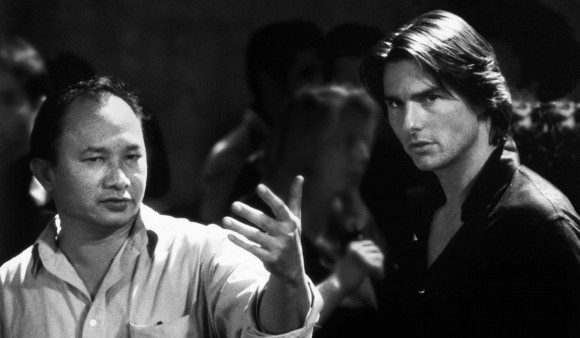

On the set of MI2. Director John Woo tells Tom Cruise what to do. Or maybe it’s the other way around?
Which brings us to 2005. It’s at times hard to remember what Cruise’s presence in the media was prior to this year. In brief, he was largely absent from it. Oh, he and wife Nicole Kidman were subjected to all the standard reporting and scrutiny that stars of their caliber were subjected to during the nineties, but there was a degree of intense privacy to Cruise. Thanks to the somewhat mercenary tactics of his long-time publicist Pat Kingsley, it was extraordinarily difficult for tabloids to get their hands on material involving Cruise. For a wider perspective on why and how this was, check this meticulously researched piece out.
But the world was changing, and the floodgates were about to open. There’s not nearly enough space in this column to discuss the Oprah interview and the lessons it taught the world about the tabloid journalism and Internet celebrity culture of the 21st Century. Suffice to say that it happened, and along with it came massive coverage of Cruise, of his relationship with Katie Holmes, of his ties with scientology, of every documentable scrap we could get our hands on. We went from knowing so little to knowing everything. Suddenly the baggage that we were taking into Tom Cruise movies wasn’t Ethan Hunt, it was couch jumping and religious fanaticism and 24/7 media coverage.
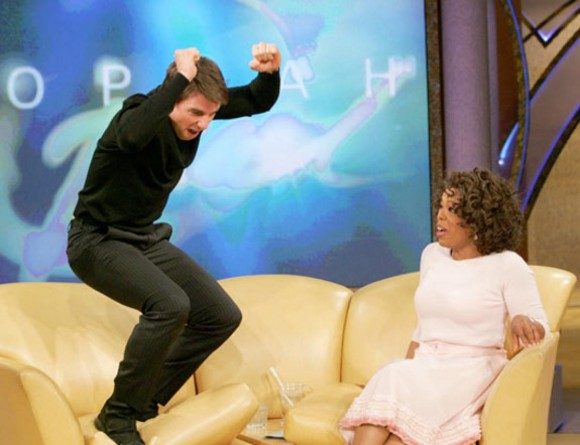

No, seriously, can we go back to the days where he played a creepy, deformed vampire? Because this is scaring the crap me out.
That we’ve come to hate Tom Cruise the person is a fascinating look into the cultural hivemind that defines pop fashion. It really took a perfect storm of publicity, media innovation, viral presence, and odd lifestyle choices to make public opinion about Hollywood’s resident white knight go as far south as it has. But even more puzzling is the fact that our condemnation of Tom Cruise the public figure has not gone hand in hand with a decrease in the success of the man as an actor and a performer. And well… maybe it’s because this is a dichotomy that’s actually been present in Tom Cruise’s acting oeuvre for a long, long time. The first big phase of Cruise’s career seems to have been about keeping himself from being cemented into any specific role, the second one seems to have been about managing distance between his signature role and the rest of his work, and maybe this third phase is all about managing the tension between the real-life Tom Cruise we’ve all come to know all too well and the fictitious roles he’s creating.
The fact of the matter is, most of our favorite Tom Cruise roles stem straight from his almost unquenchable need to remind us that for every “typical Tom Cruise role” he gives us he can give us two surprises that knock us off our feet. This is the reason why he’s put himself in the hands of bold filmmakers like P.T. Anderson, Michael Mann, and Brad Bird. It’s at the root of his shockingly hilarious roles of late, whether he’s practically unrecognizable (Tropic Thunder) or identifiable enough to clearly be sending up the egomaniacal image of himself we see in the media and are so tired of (Rock of Ages). It gives him something to prove to us, a burning fire that never lets him rest on his laurels even as he approaches his fourth decade as the world’s biggest actor.

